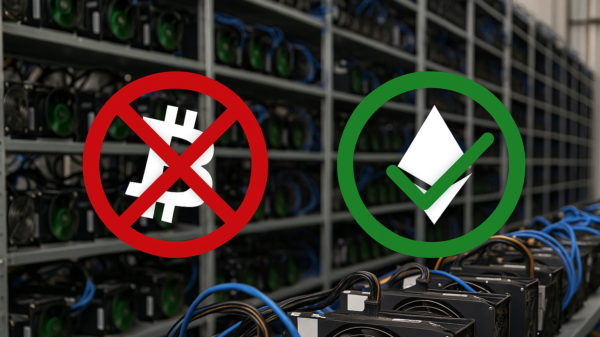The intersection of cryptocurrency mining and energy demands takes center stage as British Columbia’s Conifex Timber Inc. (CFF :TSE), previously known for forestry operations, faces setbacks in its attempt to secure power from B.C. Hydro for crypto mining activities. In a recent ruling, the B.C. Supreme Court upheld the government’s decision to pause new power connections for crypto miners. This is reigniting discussions around energy consumption, economic development, and environmental sustainability.
Moreover, cryptocurrency mining, known for its energy-intensive nature, presents significant challenges for power providers like B.C. Hydro. The continuous operation of high-powered computers requires substantial electricity, with Conifex’s proposed mining operations estimated to consume a staggering 2.5 million megawatt-hours annually. This level of consumption, equivalent to powering and heating over 570,000 apartments, raises concerns about resource allocation and environmental impact.
Amid growing concerns about excessive energy consumption, the British Columbia government implemented a moratorium on new power connections for cryptocurrency mining in December 2022. Conifex Timber Inc. challenged this policy in the B.C. Supreme Court, seeking to invalidate the government’s decision. However, Justice Michael Tammen ruled in favor of the government, emphasizing the reasonableness and non-discriminatory nature of the moratorium.
Read more: U.S. Energy Data Agency monitors cryptocurrency mining power
Read more: BTC Digital opens up Ethereum proof-of-stake to investors
Cryptocurrency miner’s appeal: regulatory hurdles in B.C.
Following the court’s ruling, Conifex expressed profound disappointment and indicated a strong inclination toward pursuing an appeal in the face of what it perceives as a missed opportunity by the government. The company passionately argued that the government’s decision failed to recognize the potential for enhanced energy affordability. Additionally, Conifex argued, the court also overlooked the prospects for technological innovation and economic growth associated with cryptocurrency mining activities.
Despite the regulatory setback, Conifex remains steadfast in its commitment to exploring various avenues to propel its crypto mining endeavors forward. The company is unwavering in its determination to navigate through the regulatory challenges it faces. The company views them as temporary hurdles on the path to realizing its vision.
B.C. Hydro’s comprehensive report shed light on the intricate complexities involved in integrating crypto mining operations into the province’s energy landscape. The staggering surge in power demand emanating from crypto mining, often likened to “powering a small country,” presents formidable challenges to the province’s clean energy goals and ongoing electrification initiatives, particularly against the backdrop of the increasing adoption of electric vehicles and heat pumps.
Furthermore, the report underscored prevailing concerns surrounding resource allocation and the potential for cost escalation for other consumers. This highlights the urgent need for a meticulously balanced approach to energy policy formulation and implementation.
The B.C. Supreme Court’s resolute decision supports the government’s moratorium on new power connections for cryptocurrency mining. This emphasizes the importance of ongoing discussions about energy consumption, economic development, and environmental sustainability in the province. As British Columbia navigates the complex implications of crypto mining on its energy infrastructure, collaboration among stakeholders is increasingly crucial.
zartasha@mugglehead.com














